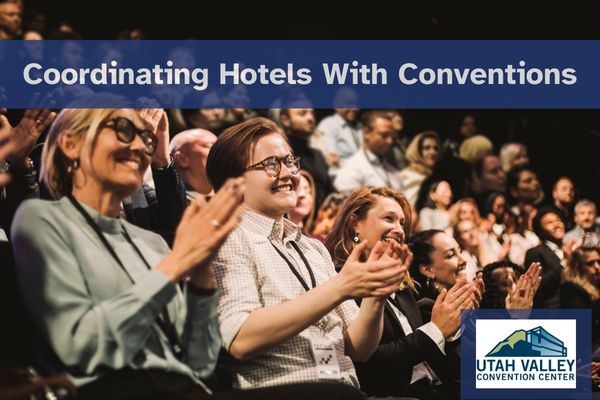When planning for any convention, meticulous preparation is paramount to ensuring a seamless and successful event.
Early engagement, detailed planning, and collaboration play pivotal roles in laying the foundation for a well-executed and memorable convention.

Common Issues When Coordinating a Hotel With Convention Space
Coordinating a hotel with convention space can present various challenges.
Here are some common issues that event planners and hotel staff might face:
- Availability and Scheduling Conflicts:
- Limited availability of convention space, especially during peak seasons or popular event dates.
- Scheduling conflicts with other events or renovations within the hotel.
- Communication Challenges:
- Poor communication between event planners and hotel staff, leading to misunderstandings regarding requirements and expectations.
- Lack of a centralized communication system for updates and changes.
- Technical and Audio-Visual Issues:
- Inadequate or outdated audio-visual equipment, which can impact presentations and overall event experience.
- Insufficient technical support during events, leading to delays and disruptions.
- Logistical Concerns:
- Inefficient loading and unloading processes for event materials and equipment.
- Limited storage space for event supplies and materials.
- Space Limitations:
- Inadequate or improperly configured meeting spaces that don’t meet the specific needs of the event.
- Difficulty in accommodating last-minute changes in attendee numbers.
- Catering Challenges:
- Issues with food and beverage services, such as delays, quality concerns, or insufficient options for dietary restrictions.
- Difficulties in coordinating catering requirements with the hotel’s kitchen staff.
- Contractual and Financial Matters:
- Disputes over contract terms and conditions, including pricing, cancellation policies, and billing discrepancies.
- Challenges in negotiating favorable terms for both parties.
- Guest Accommodations:
- Insufficient hotel room availability, especially if there are multiple events occurring simultaneously.
- Problems with room reservations and guest satisfaction.
- Regulatory Compliance:
- Challenges in complying with local regulations and codes for events, such as safety requirements and occupancy limits.
- Marketing and Promotion:
- Limited support or collaboration between the hotel and event organizers in marketing and promoting the event.
- Difficulty in attracting attendees due to inadequate promotion efforts.
- Environmental Considerations:
- Issues related to sustainability and environmental practices, such as waste management and energy consumption during the event.
To address these challenges, effective communication, thorough planning, and collaboration between the hotel and event organizers are crucial.
Clear expectations, a detailed contract, and a proactive approach to problem-solving can contribute to the success of events hosted in hotel convention spaces.
Should you book an event venue with a hotel attached or is it better to use surrounding hotels?
There are pros and cons to both booking an event venue with an attached hotel and using separate venues. Here’s a breakdown to help you decide:
Venue with attached hotel:
Pros:
- Convenience: Guests can easily walk between their rooms and the event space. This is especially helpful for evening events or if there’s a lot of travel involved.
- Logistics: Everything is in one place, simplifying coordination with the venue and catering staff. No need to arrange transportation between locations.
- Group rates: You may be able to negotiate special room rates for your guests with the hotel.
Cons:
- Cost: Venues with attached hotels can be more expensive than standalone venues.
- Limited space: Ballrooms in attached hotels may have limitations on size or amenities compared to dedicated event venues.
- Less choice: You’re limited to the hotel’s catering options and event space configurations.
Separate venue and hotel:
Pros:
- Selection: More variety in venue options, including unique historical locations or event spaces with a specific theme.
- Potentially lower cost: Standalone venues may be cheaper, especially if you’re flexible with dates and times. (There still might be event discounts at these hotels too!)
- Catering options: Wider selection of caterers to choose from, which may better suit your budget or dietary needs.
Cons:
- Logistics: More coordination needed for transportation and communication between the venue and hotel if hotels are close-by and/or walking distance.
- Guest experience: Guests will need to travel between the hotel and venue, which might be inconvenient in certain cities or towns.
- Room block management: Negotiating room rates might be more complex if you’re not using the venue’s attached hotel, depending on the event.
If you’re looking for the convenience of a venue with easy access to lodging, but also want the flexibility of a standalone venue, then a convention center like the Utah Valley Convention Center (UVCC) could be a great option. Here’s why:
The UVCC boasts accessibility with several hotels located right across the street, including the Provo Marriott Hotel and Hyatt Place Provo. This provides attendees with the comfort of having their rooms just steps away, eliminating the need to arrange transportation or navigate unfamiliar streets at night.
At the same time, the UVCC offers the advantages of a dedicated event venue. You’ll likely have more flexibility in terms of catering options, event space configurations, and potentially even pricing compared to a hotel venue. Plus, the UVCC is designed specifically for events, so it likely has features like dedicated loading areas, ample meeting rooms, and advanced audio/visual capabilities that might not be available in a hotel ballroom.
So, if you envision an event where ease of access is important but also value the selection and customizability of a standalone venue, then a convention center like the UVCC surrounded by accessible hotels can be an ideal choice.
Planning an Event near Provo, Utah?
Use the free estimate tool from Utah Valley Convention Center!
Ways To Prepare When Coordinating Hotels With Convention Space
Coordinating hotels with convention space involves thorough preparation to ensure a successful event.
Here are some key ways to prepare effectively:
- Define Event Objectives: Clearly outline the goals and objectives of the event. Understanding the purpose will guide your decisions in selecting appropriate meeting spaces and services.
- Conduct a Needs Assessment: Identify the specific requirements of your event, such as the number of attendees, preferred room setups, audio-visual needs, and catering preferences.
- Research and Select the Right Hotel:
- Consider the location, size, and amenities of potential hotels with convention space.
- Research the reputation of the hotel, its experience in hosting similar events, and reviews from previous clients.
- Engage Early with Hotel Staff: Initiate communication with the hotel staff as early as possible. Discuss your event requirements and inquire about their capabilities and available resources.
- Site Inspection:
- Schedule a site inspection to evaluate the meeting spaces, accommodations, and overall facilities.
- Verify the functionality of audio-visual equipment and assess the potential for customization of meeting spaces.
- Negotiate Contracts: Negotiate a detailed contract that clearly outlines all terms and conditions, including meeting space costs, catering services, room blocks, cancellation policies, and any additional charges.
- Establish a Communication Plan:
- Develop a comprehensive communication plan that includes regular updates between the hotel and your event planning team.
- Designate a point of contact on both sides to facilitate smooth communication.
- Create a Detailed Event Schedule:
- Develop a detailed event schedule that outlines the timeline for setup, registration, sessions, meals, and teardown.
- Share this schedule with the hotel staff to ensure alignment and coordination.
- Coordinate Logistics:
- Plan and coordinate logistics such as loading and unloading of equipment, storage of event materials, and transportation for attendees.
- Verify the availability of parking and any necessary permits for logistical operations.
- Attendee Accommodations:
- Work with the hotel to manage room blocks effectively. Ensure room reservations are seamless and that attendees receive relevant booking information.
- Confirm the availability of special amenities or services for event attendees.
- Plan for Contingencies:
- Anticipate potential challenges and develop contingency plans to address unforeseen circumstances.
- Have a clear understanding of the hotel’s emergency procedures and communication channels.
- Staff Training:
- If applicable, train your event staff on the hotel’s layout, policies, and procedures.
- Communicate specific roles and responsibilities to ensure everyone is on the same page during the event.
- Promote Collaboration: Foster a collaborative relationship with the hotel staff. Establish a teamwork mentality to address issues and challenges collectively.
- Stay Informed About Local Regulations: Be aware of local regulations and compliance requirements for events. Ensure that your event adheres to safety and occupancy standards.
- Post-Event Evaluation:
- After the event, conduct a debriefing session with the hotel staff to discuss what worked well and areas for improvement.
- Gather feedback from attendees to inform future event planning.
By preparing thoroughly and staying organized, you can enhance the coordination of hotels with convention space, leading to a more successful and seamless event experience.


